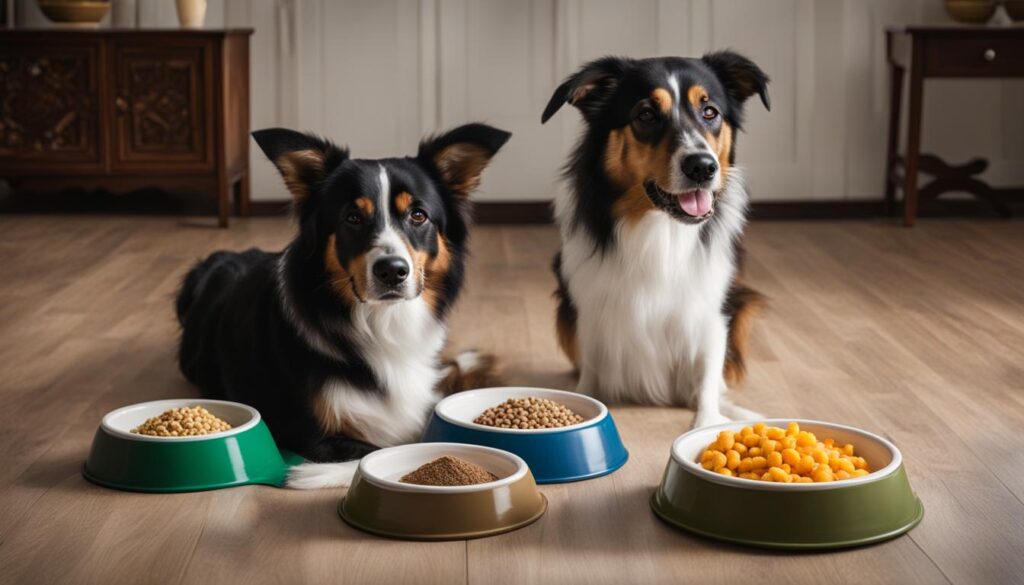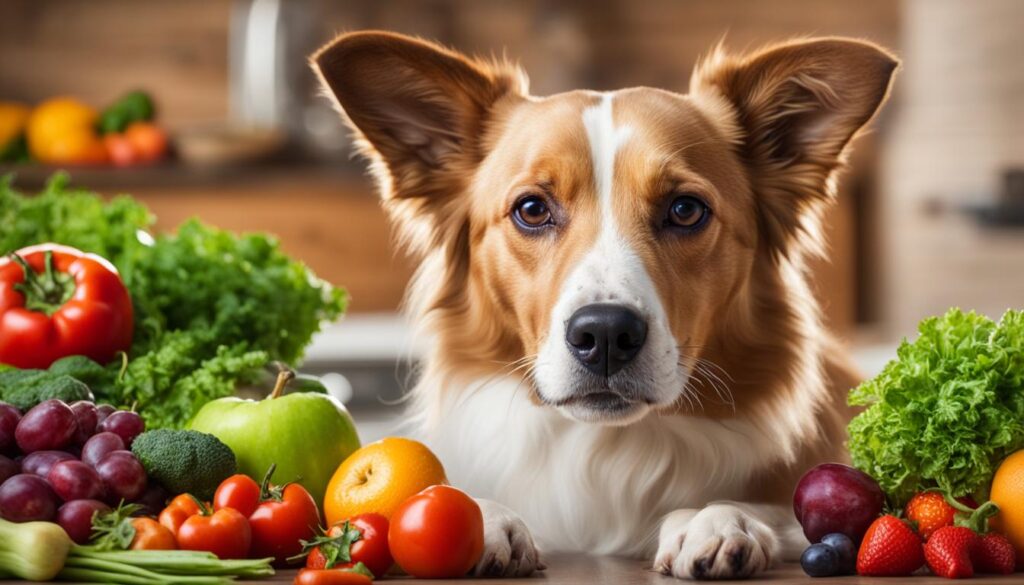Neutering or spaying your furry friend is an important step in their overall health and well-being. However, it’s essential to understand the impact of these procedures on their nutritional needs. Hormonal changes and altered metabolism can lead to weight gain and other health issues. To ensure the best care for your spayed or neutered dog, it’s crucial to make dietary adjustments and manage their weight effectively.
Key Takeaways:
- Neutering can increase the risk of weight gain in dogs due to reduced energy needs.
- Feeding adjustments are necessary to maintain a lean and healthy physique.
- Diets specially formulated for neutered pets can help manage calorie intake.
- Exercise routines should be adapted to maximize physical activity.
- Monitoring treats’ calorie intake is crucial in weight management post-neutering/spaying.
The Impact of Neutering/Spaying on Weight Gain
Neutering or spaying your dog is an important decision that can have long-term effects on their health and well-being. One of the key concerns after the surgery is the potential for weight gain. Studies have shown that neutered dogs are more than twice as likely to become obese compared to sexually intact dogs. This increased risk is attributed to several factors, including changes in energy requirements and feeding behavior.
After the surgery, the energy needs of neutered dogs decrease, leading to reduced physical activity and changes in metabolism. If the food intake remains the same, the calorie intake will exceed energy expenditure, resulting in weight gain. To prevent this, it is crucial to manage their weight through proper diet and nutrition.
To ensure that your neutered dog maintains a healthy weight, it is important to make necessary nutrient adjustments. Feed them according to their ideal weight, rather than their current weight, and consider using specialized diets formulated for neutered dogs. These diets have adapted calorie levels to reduce calorie intake while still providing a satisfying amount of food. Additionally, high protein diets can help maintain muscle mass and prevent the accumulation of unwanted fat.
Exercise also plays a crucial role in weight management post-neutering/spaying. Tailor their exercise routines to maximize physical activity, taking into account their age, breed, and overall health. Regular monitoring of their weight and limiting calorie intake from treats are also essential. By taking a proactive approach to their nutrition and weight management, you can help your neutered dog live a healthy and happy life.

| Caloric Needs Post-Surgery in Dogs | Managing Weight Gain After Spaying/Neutering | Nutrient Adjustments After Canine Surgery |
|---|---|---|
| Neutered dogs have lower caloric needs due to decreased energy requirements. | Weight gain can be managed through proper diet and nutrition, as well as tailored exercise routines. | Nutrient adjustments should be made to reduce calorie intake while still providing a satisfying amount of food. |
| High protein diets can help maintain muscle mass and prevent the accumulation of unwanted fat. | Regular monitoring of weight and limiting calorie intake from treats are essential in weight management. | Consulting a veterinarian or nutrition team can provide further guidance in providing optimal nutrition for neutered dogs. |
Managing Weight After Neutering/Spaying
After neutering or spaying your dog, it is important to manage their weight to ensure optimal health. Neutered dogs have lower energy requirements, which can lead to weight gain if their diet is not adjusted accordingly. To prevent this, feeding adjustments and a balanced diet are necessary.
Feeding your neutered dog according to their ideal weight is crucial. It may be tempting to continue feeding them the same amount as before the procedure, but this can result in excess calorie intake. Instead, consult with your veterinarian to determine the appropriate portion size based on your dog’s current weight and activity level.
Specialized diets for neutered dogs can also be beneficial in managing weight. These diets are formulated to have reduced calorie levels while still providing all the necessary nutrients. They often contain higher levels of protein, which helps maintain muscle mass and prevents the storage of unwanted fat.
In addition to diet, exercise is an important aspect of weight management. It’s essential to tailor your dog’s exercise routine to maximize physical activity. Regular walks, playtime, and interactive toys can help burn calories and keep your dog active and healthy.
Key Points:
- Feeding adjustments are necessary after neutering or spaying to prevent weight gain.
- Consult with your veterinarian to determine the appropriate portion size for your neutered dog.
- Consider specialized diets for neutered dogs with reduced calorie levels and higher protein content.
- Tailor your dog’s exercise routine to maximize physical activity and burn calories.

| Recommended Feeding Guidelines for Neutered Dogs | Portion Size | Activity Level |
|---|---|---|
| Small Breed Dogs | 1/2 cup to 1 cup per day | Low to Moderate |
| Medium Breed Dogs | 1 to 1 1/2 cups per day | Moderate |
| Large Breed Dogs | 1 1/2 to 2 cups per day | Moderate to High |
Nutritional Support for Spayed/Neutered Dogs
After spaying or neutering your dog, it’s important to understand that hormonal changes can impact their nutritional needs and eating behaviors. These changes can lead to a decrease in energy requirements and a potential increase in weight gain if not managed properly. To ensure optimal health for your spayed or neutered dog, it’s essential to provide appropriate nutritional support and make necessary dietary adjustments.
One key aspect of nutritional care for spayed/neutered dogs is to reduce their daily food intake. It is recommended to decrease the amount of food by approximately 10% from the guideline amount. This adjustment helps to account for the decrease in metabolism and energy needs after the surgery. By monitoring and adjusting the portion size accordingly, you can prevent excessive weight gain and maintain a healthy body condition.
“Reducing the food intake by 10% from the guideline amount can help manage weight gain and prevent obesity in spayed/neutered dogs.”
In addition to controlling portion sizes, it’s crucial to avoid excessive supplementation with other foods and treats. Providing too many extra calories can contribute to weight gain, undermining your efforts to manage your dog’s weight effectively. Stick to a balanced and nutritionally complete diet that meets the specific needs of spayed/neutered dogs.
Regular weighing and monitoring of your dog’s weight are also essential for ensuring they stay within a healthy range. If you notice any significant weight changes, consult with a veterinarian or nutrition team for further guidance on adjusting their diet and nutritional support.
| Nutritional Support Tips for Spayed/Neutered Dogs |
|---|
| Reduce daily food intake by approximately 10% from the guideline amount |
| Avoid excessive supplementation with other foods and treats |
| Monitor and adjust portion sizes to maintain a healthy body condition |
| Regularly weigh your dog and consult with a veterinarian or nutrition team if significant weight changes occur |
By providing the necessary nutritional care and support for your spayed or neutered dog, you can help them maintain a healthy weight and overall well-being. Understanding the hormonal changes and making appropriate dietary adjustments will ensure their nutritional needs are met throughout their life.

Conclusion
Now that you understand the nutritional adjustments necessary after neutering or spaying your dog, you can ensure their post-operative nutrition supports their overall well-being. Neutering can increase the risk of weight gain in pets, so it’s crucial to make dietary changes to maintain a healthy weight.
Feeding your pet according to their ideal weight is key. Specialized diets formulated for neutered pets can help control calorie intake while still providing a satisfying amount of food. These diets often have adapted calorie levels to prevent excessive weight gain.
Additionally, implementing regular exercise routines tailored to your pet’s needs can maximize physical activity and support weight management. Remember to monitor and limit calorie intake from treats as well to prevent unnecessary weight gain.
By following these nutritional adjustments and providing proper post-operative nutrition, you can help your spayed or neutered dog maintain optimal health and prevent the onset of weight-related health conditions. Remember to consult with your veterinarian or nutrition team for further guidance on providing the best nutrition for your furry friend.
FAQ
How does neutering impact a pet’s weight?
Neutering can increase the risk of weight gain in pets due to a decrease in growth rate and energy needs. Neutered animals often consume more food but have a reduced basal metabolic rate, making them prone to becoming overweight.
Why do neutered pets consume more food but have a reduced metabolic rate?
Neutering decreases the energy requirements of pets, leading to reduced physical activity and changes in feeding behavior. If food intake is not adjusted accordingly, calorie intake will exceed energy expenditure, resulting in weight gain.
How can I manage weight gain after my pet is neutered/spayed?
Feeding adjustments are necessary to manage weight gain after neutering/spaying. It is important to feed your pet according to their ideal weight, using diets specifically formulated for neutered pets with adapted calorie levels. High protein diets can help maintain muscle mass and prevent the storage of unwanted fat. Regular exercise and monitoring of treat intake are also important in weight management.
How do hormonal changes after spaying/neutering affect a dog’s weight?
Hormonal changes after spaying/neutering can decrease a dog’s energy requirements and influence their metabolism, potentially leading to weight gain. Adjusting their diet, reducing daily intake, and avoiding excessive supplementation with other foods and treats can help prevent weight gain.
Is it necessary to consult a veterinarian or nutrition team for guidance on nutrition after spaying/neutering?
It is recommended to consult a veterinarian or nutrition team for guidance on providing optimal nutrition for spayed/neutered dogs. They can provide further advice on dietary adjustments and weight management strategies to ensure your pet maintains optimal health.





